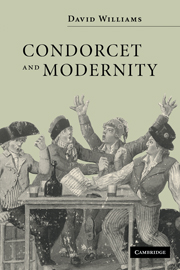Book contents
- Frontmatter
- Contents
- Acknowledgements
- References and abbreviations
- Introduction
- 1 Profile of a political life
- 2 Human nature and human rights
- 3 The civil order
- 4 Managing enlightenment
- 5 Reform and the moral order
- 6 New constructions of equality
- 7 Justice and the law
- 8 Representative government
- 9 The economic order
- 10 Managing the Revolution
- Conclusion: the human odyssey
- Bibliography
- Name index
- Subject index
3 - The civil order
Published online by Cambridge University Press: 22 September 2009
- Frontmatter
- Contents
- Acknowledgements
- References and abbreviations
- Introduction
- 1 Profile of a political life
- 2 Human nature and human rights
- 3 The civil order
- 4 Managing enlightenment
- 5 Reform and the moral order
- 6 New constructions of equality
- 7 Justice and the law
- 8 Representative government
- 9 The economic order
- 10 Managing the Revolution
- Conclusion: the human odyssey
- Bibliography
- Name index
- Subject index
Summary
THE SOCIAL PACT
The historical canvas that Condorcet painted in the Esquisse d'un tableau historique des progrès de l'esprit humain (Sketch for a historical survey of the progress of the human mind) not only measured the distance from the pre-social state of nature to modernity, but also explored the links that modernity still had with that remote dawn of human society. Continuity is no less important a factor in Condorcet's view of the passage from the state of nature to the civil order than the complementary phenomena of rupture and regeneration. Nine of the époques into which he divided the stages of the human journey in the Esquisse are a celebration of the slow but sure emergence of man from the darkness of his early history, a process shaped by the irresistible dynamics of perfectionnement.
Condorcet located the start of man's transition from the nomadic, individualist isolation of wild, brutish nature to vestigial forms of civil society in a period of undated time prior to the first époque of early communal life that he described in great detail in the opening pages of the Esquisse. From small groups of hunter-gatherer families, gradually refining their skills, developing language and ‘a small number of moral ideas’, communities evolved. Progress was slow, with survival still dependent on chance and the seasons.
- Type
- Chapter
- Information
- Condorcet and Modernity , pp. 69 - 91Publisher: Cambridge University PressPrint publication year: 2004

